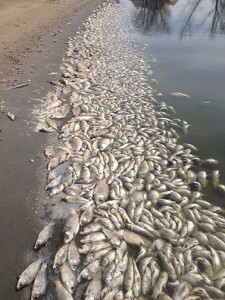
TWIN LAKES, normally a popular spot for boating, swimming and fishing throughout the summer, is plagued with dead, rotting fish this spring, bringing the lake’s summer usability into question. It is unknown as of yet if any fish remain alive in the lake. Game, Fish and Parks officials plan to test the lake for living fish.
The long, extremely cold winter has brought devastation to Twin Lakes in southern Sanborn County, as it has become a watery mass grave for its fish. The destructive effects of winter became evident about two weeks ago when the ice finally started to melt from around its edges. As the ice sheet shrunk, exposing thousands of dead fish, Twin Lakes became a smorgasbord for migrating birds and ducks, including large numbers of Bald and Golden eagles. Now with the ice completely gone, the extent of the damage is plain to see. Dead fish, mostly the invasive carp, have piled up around the shoreline, while more can still be seen bobbing throughout the lake. The Game, Fish and Parks are sending their Southeast Fish Manager to check out the situation and do a net test to determine whether or not any fish remain alive. GFP says they already had a stocking plan in place for Twin Lakes, but there was no information as to when that may take place. They plan to restock the lake based on their findings from the net test. Any sort of clean-up plan does not seem to be in the plans. GFP officials say it is likely that similar shallow, soft bottom lakes such as Twin Lakes will have winterkill problems this spring. A cold and long winter causing extra thick ice, paired with a low water level late in the season is to blame, they say. Winterkill occurs when fish suffocate due to lack of oxygen in the water. The ice limits the sunlight reaching aquatic plants, which then cut back on the amount of oxygen they produce. When the plants die, the decomposition uses oxygen, contributing to the problem. If the oxygen levels become too low, fish die. Early ice-on and late ice-out years, such as this one, increase winterkill potential, and shallow lakes with excess vegetation and mucky bottoms, such as Twin Lakes, are especially prone. Those factors paired with a low water level last fall created a perfect storm for this spring’s winterkill. As the stench intensifies, local residents are frustrated, since the wells feeding the lake were inexplicably plugged some years ago. Area residents complained to GFP representatives during a public meeting a couple years ago, but weren’t given any solid answers.

Tweet